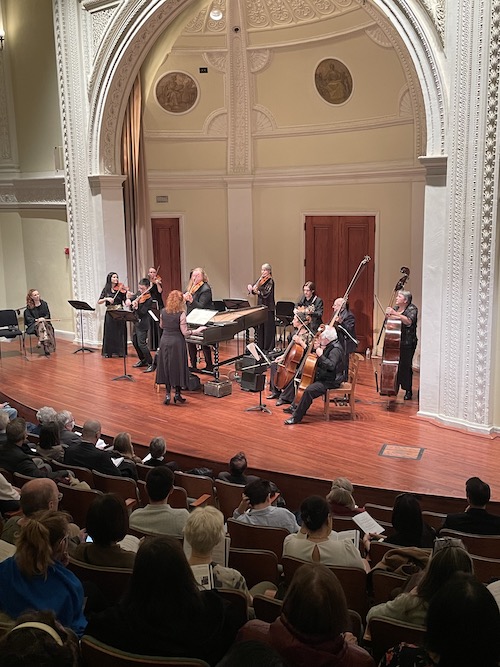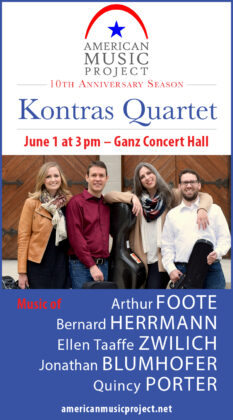Apollo’s Fire takes a varied and rewarding journey to Venice

The Cleveland-based Baroque orchestra Apollo’s Fire continues to expand its Chicago footprint to the benefit of the city’s early music scene.
After opening their third “Windy City Series” with a stellar Israel in Egypt last month in Evanston, the ensemble returned under founder and artistic director Jeannette Sorrell for its inaugural concert at the Art Institute’s Fullerton Hall on Saturday night.
The “Nights in Venice” program offered a more intimately scaled evening, centered on works of the city’s musical patron saints: Monteverdi and Vivaldi. Apollo’s Fire began with the surging opening Toccata of the former’s Orfeo, segueing into the 1608 opera’s Prologue (“La Musica”). Here soprano Erica Schuller, a standout all night, gave a stirring invocation, her robust soprano sensitively attentive to the text’s affective shading.
Schuller was similarly accomplished in the swaying variations of Frescobaldi’s “Se l’Aura spira tutta vezzosa” (from Book I of the 1630 Arie musicali collection). She projected palpable anguish in Monteverdi’s “Lamento della Ninfa” from the Madrigals, a song of a scorned woman, and throughout provided understated acting that enhanced her significant vocal artistry.
The latter selection was preceded by “Alto Giove” from Nicola Porpora’s Polifemo, arranged for two violins by Sorrell. Violinist Emi Tanabe gave an ardent instrumental lament after taking the stage to the pulsing introduction. Concertmaster Alan Choo entered to join Tanabe’s solo line, and the pair left the stage together at the aria’s close, with Schuller appearing at the opposite wing in the closing bars, setting up the betrayal of her own “Lamento.” While such stagecraft can run the risk of affectation, Apollo’s Fire kept it sufficiently subtle that it all came across naturally.
Three Vivaldi concerti were heard: the D Major for Two Violins and Two Cellos, the A Minor for Two Violins, and the G Minor for Recorder (“La Notte”). All of these bore Sorrell’s trademark Vivaldi-as-Baroque-rock-music aesthetic, with swaggering vitality and virtuosic contributions from the multiple soloists.
Violinists Choo and Tanabe joined cellists René Schiffer and Anna Steinhoff as the solo consort in the D Major Concerto, fully in sync both in their pairs and collectively, particularly in the toe-tapping, syncopated ritornello of the final Allegro. Choo was again a soloist in the A Minor Concerto, joined here by Edwin Huizinga, and the duo under Sorrell brought sweep to the fleet outer movements, and pathos to the intertwined lines of the central Larghetto.
Sorrell stepped aside from her leadership role at the harpsichord to hand things over to recorder soloist Daphna Mor for “La Notte” (no doubt in an effort to help balance the under-projected instrument by forgoing the keyboard continuo). This is one of Vivaldi’s more inventive works in the genre, more an episodic fantasia than a concerto proper. Six epigrammatic movements alternate slow and fast, evocatively conjuring a nocturnal atmosphere. Mor was a versatile soloist, aided by slight amplification, leading the supporting ensemble with poise, and leaning into the chromatic pivots of the penultimate “Il Sonno” movement.
The program closed with music of Venice’s Jewish ghetto. Three selections of Salamone Rossi Hebreo, a friend and colleague of Monteverdi’s, captured the musical melting pot of the Serenissima’s Jewish quarter, particularly the lightly stepping Gagliara detta la Norsina.
The full complement of musicians ended the night with the boisterous “Seven Ways to Cook Eggplant,” a traditional Sephardic song arranged by Sorrell. A party atmosphere prevailed as Schuller was joined by baritones Edward Vogel and Jeffrey Strauss, and eventually Sorrell herself, to sing the strophic catalogue of recipes, punctuated by a rhythmically vital refrain about a bibulous uncle.
Before the performance proper began, as the audience was filing in, Apollo’s Fire performed a prelude with students from Southland College Prep as part of their “Side-by-Side String Program,” where teaching artists work with string students in Chicago Public Schools. The professional rendition of John Eccles’ “Variations on Bellamira” they offered showed another way Apollo’s Fire contribution to the Chicago’s musical life continues to grow.
The program will be repeated 3 p.m. Sunday at the Music Institute of Chicago in Evanston. apollosfire.org
Posted in Performances




